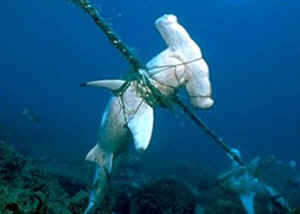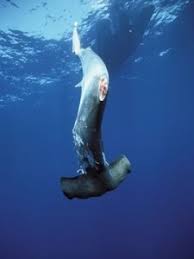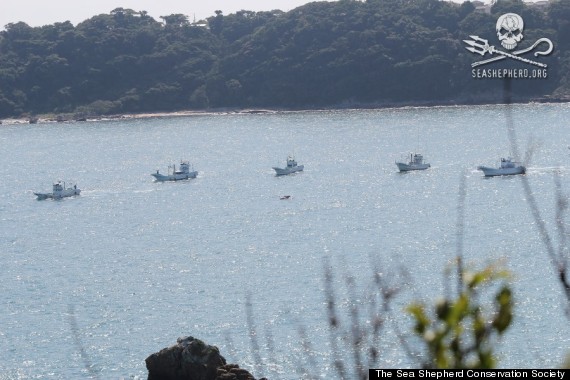Welcome everyone to the first shark blog of Operation Kibou. So first of all have you ever looked at a shark and wondered just how many of these animals exist? Have you ever thought that the Ocean is simply teeming with sharks? If you answered yes to both of those questions then you may be in for a surprise. There are currently over 400 known species of shark in existence. The vast majority of these sharks though would surprise you in both their appearance and length. Typically, many people think that sharks look something like this.
In reality though, many sharks are actually quite small and many of them look more like this than the great white pictured above.
One thing that all of these sharks have in common though is that they are all facing very real and very dangerous threats from man. For those of you who have followed any of my campaigns before, you will be familiar with these threats. If you want you can skip ahead to the recent news at the end of this blog. For those of you who have not, be prepared to be floored because the following information may shock you. I know it did me when I first found out. The first threat that man poses to sharks is what I like to call the media threat.
The media has painted sharks as monsters that humans should fear. Don't believe that? Take a look at the incredibly popular major motion picture "Jaws". You have a movie where a massive great white shark decides to terrorize a seashore town by simply eating person after person after person. Of course in the end the shark is killed and all is well, but the effects that that movie had on an entire generation of moviegoers is evident to this day. Shortly after "Jaws" was released, fisherman started killing every shark they could find because all sharks were apparently Jaws just looking to eat a human for his next meal. To this day shark movies are still being produced. Most recently in the form of Sharknado. This movie literally has a tornado full of sharks tear through a city. Sadly some people actually believe that something like that could happen. Take a listen to news stations. Whenever there is a shark attack, it becomes a huge deal. Beaches get closed, dramatic graphics appear on T.V. screens, and all the publicity causes some people to get on their boats and go on a hunt. Even Discovery Channel's Shark Week has seemingly jumped the shark (no pun intended). In recent years, Discovey's Shark Week has become full of nothing but shows depicting sharks killing people. So here we are in the year 2013 and the media is still making a massive deal about sharks. Ironically though more people are killed by dogs and cats every year. Makes me kind of wonder where all the killer cat and dog movies and shows are.
The next threat involves both commercial and recreational fishing. This one is pretty simple to understand. Sharks have a slow reproductive rate. Most of the larger species give birth to very few pups and may not breed on an annual basis. To make matters worse in a sense, sharks mature later in life than most animals making them very vulnerable to overfishing. That is a big part of what is going on right now in the world. Sharks are simply being fished far too quickly. Recreational fisherman are usually pretty good about following the rules and regulations of shark fishing. Most will catch their one shark and be done (That's the limit here in New Jersey). Recreational fisherman usually catch sharks with the intention to eat them, but at the same time, some catch them solely for their jaws and nothing more. This is a massive waste of the animal. Very similar to going to Africa and killing a rhino for it's horn. Most recreational fisherman don't do this, but sadly there are those who do. Recreational fishing does effect shark populations in a negative way, but the damage is nowhere near that of what commercial fishing has done to shark populations.
The damage that commercial fishing has done to sharks is really twofold. The first practice I'll go over is the practice of long line fishing. The second is the practice of shark finning. Long line fishing is an incredibly dangerous style of fishing, not only for sharks, but nearly any animal that lives in or ventures into the sea. Here is what long lines look like.

These lines can extend for over twenty miles and as you can see, the number of hooks is incredibly large. The biggest problem with these long lines is that they are totally indiscriminate and they are pretty much impossible to monitor at all times. This means many of the animals that get hooked die before the fisherman get to them. Normally long lines are used to catch large game fish such as tuna and swordfish. However, long lines will catch sharks, seals, turtles, small whales, unintended fish, and sea birds in addition to their intended catch. In the case of sharks, they panic after being hooked, get tangled in the line and drown.



Long line fishing is illegal off the west coast of the United States, but it is legal off the east coast. Millions of sharks die every year on long lines where they are not even the intended catch. The amount of bycatch that long line fishing produces is truly unacceptable. Many of the sharks that are caught, dead or alive, share a similar fate. That fate is the process of finning.
Shark finning is the process of catching a shark, cutting off the animal's fins and throwing the animal back into the water. Any shark that that is finned cannot survive. They will be unable to swim, sink to the bottom of the sea and die from drowning, starvation, blood loss, or they will be eaten by other animals. Right now, it is estimated that 100,000,000 sharks are being killed for their fins every year. The question you might be asking yourself is why. Why does this happen?





The answer is actually quite disturbing. The shark's fins are sold and used in a soup called shark fin soup. Shark fin soup has it's roots in China where many years ago the soup was given solely to the Emperor as a symbol of his status. Now though it is available to the public around the world and it has caused a massive, massive problem for shark populations around the world. Prior to being turned into soup, the fins are dried out. For a good idea as to just how big of a problem this is, check out this picture of shark fins drying on a rooftop in China.
Yes every one of those white, black, and grey things in the first and third pictures are all fins. That is literally thousands and thousands of fins!
In the United States, shark fin soup can sell for over $100. Yes that is $100 for a bowl of soup. All for some kind of status showing. You might be wondering. Is it even good? The answer is debatable. The shark's fin is totally tasteless, but adds a gelatinous texture to the soup and a high dose of mercury (yes the mercury that is dangerous to human health). The actual flavor of the soup comes from either the beef or chicken flavoring that is added in. For more on shark fin soup, I turn things over to Gordon Ramsay.
I don't think much more needs to be said on the topic of shark finning and shark fin soup right now. The bottom line is that shark finning is incredibly dangerous to sharks. These animals simply cannot compete with commercial fishing pressures. Shark finning is becoming illegal in many areas around the world, but it is nowhere near enough. Even in areas where sharks are protected people are still finning. Countries simply are not enforcing their laws hard enough when it comes to preventing finning. One of the large reasons for that is that countries simply cannot afford to have entire fleets out watching all the vessels in their waters. The best thing people can do is, if finning is illegal in the area, is to call the authorities and report the vessel. We all need to help put a stop to illegal shark finning and shark finning in general.
As dire a situation that sharks are in, there is still hope. Mind you, we need to act quickly if we are to save these animals, but still hope remains. One of the most recent signs of this is what is being called a large decrease in consumption of shark fins in China. This is quite significant, but apparently has little to do with new conservation measures that have been instated in the Pacific. Instead, it has a lot to do with the Chinese government crackdown on corruption and opposition to extravagance. It also has to do with culture changes that are apparently happening in China as more and more young people are avoiding shark fin. To go along with this, more and more Pacific islands are becoming designated shark sanctuaries. Though they are not able to protect 100% of the sharks, the Marshall Islands for example has arrested two foreign vessels, banned them from Marshall Island waters, and fined them each over $100,000. That doesn't sound like much to us here in the United States, but you have to remember things are different in other parts of the world.
In the United States, NOAA has so far been unable to undermine the state shark conservation laws that were put in place by several states including California, Washington, New York, and Delaware. Hope still remains for these animals. Operation Kibou is all about that hope. So what can you do? Well there are a few things really. You can visit shark conservation groups and institutions such as my friends over at the Shark Research Institute (www.sharks.org) and Sea Shepherd Conservation Society (www.seashepherd.org) to learn more about sharks and what is being done to save them. You can visit local dining locations that serve shark fin soup and explain to the management about the desperate situations that sharks are in. You can inform friends and family that shark populations are literally being wiped out. You can watch documentaries such as Sharkwater and show them to friends and family or possibly even encourage local schools to do a screening. Time is running out for sharks, but hope remains. Let's all work together to save these animals!
As I said at the start of the blog, what you were about to read may shock you. It's a truly frightening situation for these animals and the fight to save them continues on. My next blog will be an introduction to the whale portion of Operation Kibou unless something major comes up on the dolphin or shark front. From then on there will be no planned blogs. Instead the blogs will be unplanned so I won't be telling you guys what the next one will be about. Thank you all for reading and I hope you all had a great holiday weekend.


















